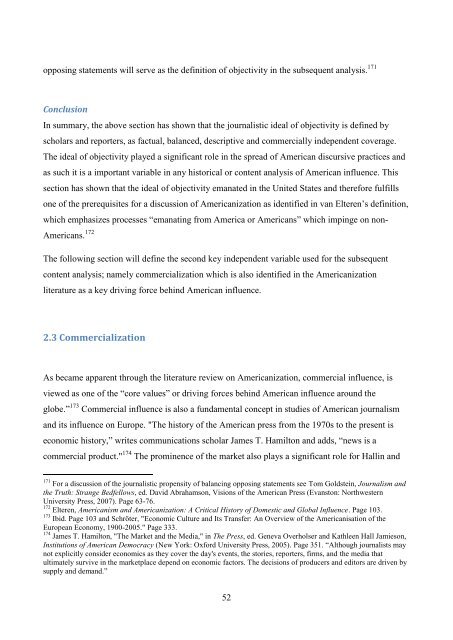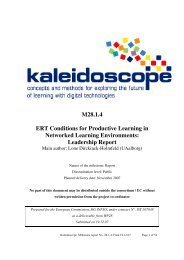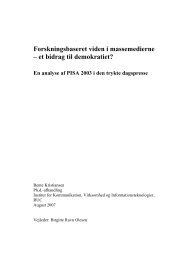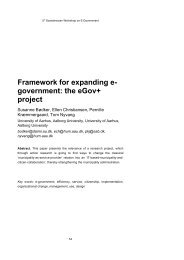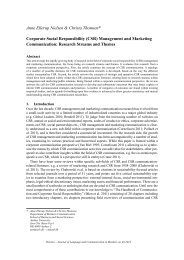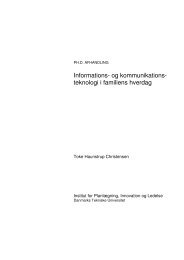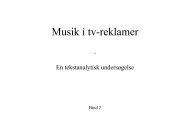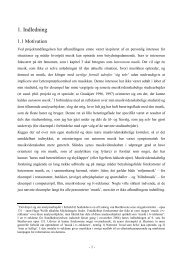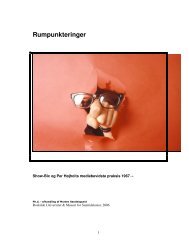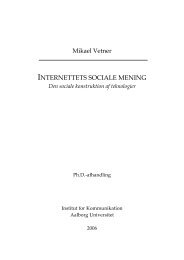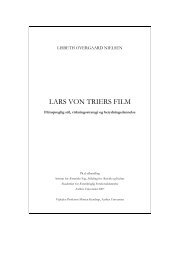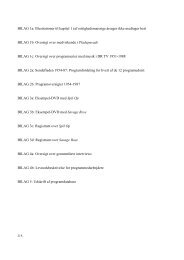The Jeremiad Over Journalism
The Jeremiad Over Journalism
The Jeremiad Over Journalism
Create successful ePaper yourself
Turn your PDF publications into a flip-book with our unique Google optimized e-Paper software.
opposing statements will serve as the definition of objectivity in the subsequent analysis. 171<br />
Conclusion<br />
In summary, the above section has shown that the journalistic ideal of objectivity is defined by<br />
scholars and reporters, as factual, balanced, descriptive and commercially independent coverage.<br />
<strong>The</strong> ideal of objectivity played a significant role in the spread of American discursive practices and<br />
as such it is a important variable in any historical or content analysis of American influence. This<br />
section has shown that the ideal of objectivity emanated in the United States and therefore fulfills<br />
one of the prerequisites for a discussion of Americanization as identified in van Elteren‘s definition,<br />
which emphasizes processes ―emanating from America or Americans‖ which impinge on non-<br />
Americans. 172<br />
<strong>The</strong> following section will define the second key independent variable used for the subsequent<br />
content analysis; namely commercialization which is also identified in the Americanization<br />
literature as a key driving force behind American influence.<br />
2.3 Commercialization<br />
As became apparent through the literature review on Americanization, commercial influence, is<br />
viewed as one of the ―core values‖ or driving forces behind American influence around the<br />
globe.‖ 173 Commercial influence is also a fundamental concept in studies of American journalism<br />
and its influence on Europe. "<strong>The</strong> history of the American press from the 1970s to the present is<br />
economic history,‖ writes communications scholar James T. Hamilton and adds, ―news is a<br />
commercial product." 174 <strong>The</strong> prominence of the market also plays a significant role for Hallin and<br />
171<br />
For a discussion of the journalistic propensity of balancing opposing statements see Tom Goldstein, <strong>Journalism</strong> and<br />
the Truth: Strange Bedfellows, ed. David Abrahamson, Visions of the American Press (Evanston: Northwestern<br />
University Press, 2007). Page 63-76.<br />
172<br />
Elteren, Americanism and Americanization: A Critical History of Domestic and Global Influence. Page 103.<br />
173<br />
Ibid. Page 103 and Schröter, "Economic Culture and Its Transfer: An <strong>Over</strong>view of the Americanisation of the<br />
European Economy, 1900-2005." Page 333.<br />
174<br />
James T. Hamilton, "<strong>The</strong> Market and the Media," in <strong>The</strong> Press, ed. Geneva <strong>Over</strong>holser and Kathleen Hall Jamieson,<br />
Institutions of American Democracy (New York: Oxford University Press, 2005). Page 351. ―Although journalists may<br />
not explicitly consider economics as they cover the day's events, the stories, reporters, firms, and the media that<br />
ultimately survive in the marketplace depend on economic factors. <strong>The</strong> decisions of producers and editors are driven by<br />
supply and demand.‖<br />
52


